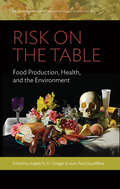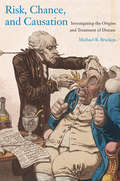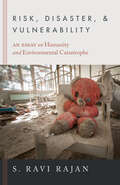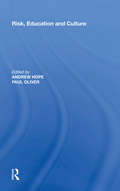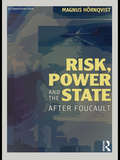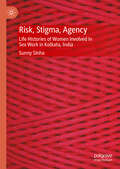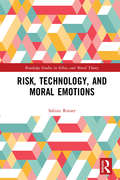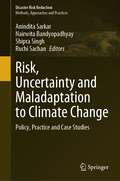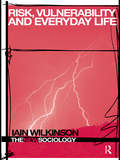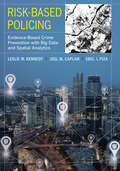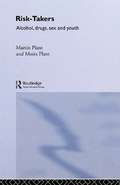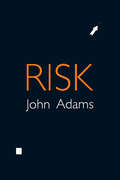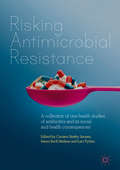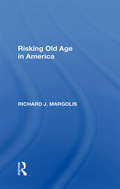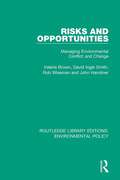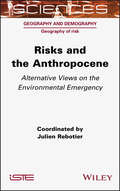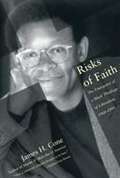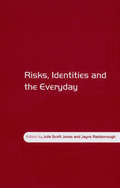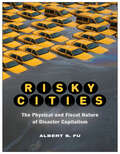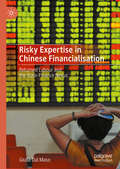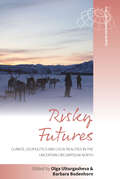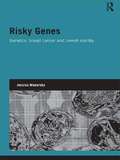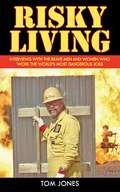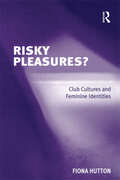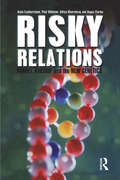- Table View
- List View
Risk on the Table: Food Production, Health, and the Environment (Environment in History: International Perspectives #21)
by Angela N. H. Creager and Jean-Paul GaudillièreOver the last century, the industrialization of agriculture and processing technologies have made food abundant and relatively inexpensive for much of the world’s population. Simultaneously, pesticides, nitrates, and other technological innovations intended to improve the food supply’s productivity and safety have generated new, often poorly understood risks for consumers and the environment. From the proliferation of synthetic additives to the threat posed by antibiotic-resistant bacteria, the chapters in Risk on the Table zero in on key historical cases in North America and Europe that illuminate the history of food safety, highlighting the powerful tensions that exists among scientific understandings of risk, policymakers’ decisions, and cultural notions of “pure” food.
Risk, Chance, and Causation
by Michael B. BrackenThe press and other media constantly report news stories about dangerous chemicals in the environment, miracle cures, the safety of therapeutic treatments, and potential cancer-causing agents. But what exactly is actually meant by "increased risk"--should we worry if we are told that we are at twice the risk of developing an illness? And how do we interpret "reduced risk" to properly assess the benefits of noisily touted dietary supplements? Demonstrating the difficulty of separating the hype from the hypothesis, noted epidemiologist Michael Bracken clearly communicates how clinical epidemiology works. Using everyday terms, Bracken describes how professional scientists approach questions of disease causation and therapeutic efficacy to provide readers with the tools to help them understand whether warnings of environmental risk are truly warranted, or if claims of therapeutic benefit are justified.
Risk, Disaster, and Vulnerability: An Essay on Humanity and Environmental Catastrophe
by S. Ravi RajanOver the course of the past century, there has been a sustained reflective engagement about environmental risks, disasters, and human vulnerability in our modern industrial world. This inquiry has raised a host of crucial questions. Just how safe is humanity in a world of toxic chemicals and industrial installations that have destructive potential? Is it feasible to prevent large-scale catastrophes like the ones in Bhopal, Chernobyl, and Fukushima and smaller-scale disasters such as oil spills and gas leaks? How do environmental hazards affect social and political orders? S. Ravi Rajan expertly synthesizes decades of public policy and academic discourse on how societies measure and ultimately come to terms with risk, danger, and vulnerability and offers a fresh, humanistic perspective for grappling with the new global scale and interconnectedness of these threats.
Risk, Education and Culture (Routledge Library Editions: Sociology Of Education Ser. #1)
by Andrew HopeIn recent years education has become increasingly perceived as an area of risk. A number of highly publicized incidents have heightened awareness of the potential dangers to be found in teaching institutions. Although there is now a substantial conceptual literature on risk and the meaning of the risk society, such ideas have not to date been rigorously applied to the educational sector. The authors of this innovative volume address this gap, discussing the relevance of risk discourses to educational processes. They recognize that risk discourses themselves (both academic and political) do not necessarily relate to actual dangers within education and they examine the differences between the risk narratives of expert and layperson, teacher and student, practitioner and academic. This book will greatly interest both sociologists and educationalists interested in the interaction between education and contemporary trends in society.
Risk, Power and the State: After Foucault
by Magnus HörnqvistRisk, Power and the State addresses how power is exercised in and by contemporary state organisations. Through a detailed analysis of programmatic attempts to shape behaviour linked to considerations of risk, this book pursues the argument that, whilst Foucault is useful for understanding power, the Foucauldian tradition – with its strands of discourse analysis, of governmentality studies, or of radical Deleuzian critique – suffers from a lack of clarification on key conceptual issues. Oriented around four case studies, the architecture of the book devolves upon the distinction between productive and repressive power. The first two studies focus on productive power: the management of long-term unemployment in the public employment service and cognitive-behavioural interventions in the prison service. Two further studies concern repressive interventions: the conditions of incarceration in the prison service and the activity of the customs service. These studies reveal that power, as conceptualised within the Foucauldian tradition, must be modified. A more complex notion of productive power is needed, which covers interventions that appeal to desires, and which govern both at a distance and at close range. Additionally, the simplistic paradigm of repressive power is called into question by the need to consider the organising role of norms and techniques that circumvent agency. Finally, it is argued, Foucault's concept of strategies – which accounts for the thick web of administrative directives, organisational routines, and techniques that simultaneously shape the behaviour of targeted individuals and members of the organisation – requires an organisational dimension that is often neglected in the Foucauldian tradition.
Risk, Stigma, Agency: Life Histories of Women Involved in Sex Work in Kolkata, India (Palgrave Advances in Sex Work Studies)
by Sunny SinhaThis book centers the life histories of three women engaged in sex work in Kolkata, India to show how they make sense of their lived experiences and reveals deep insights into the risks women face in the current social environment of India. Much of the risk discourse surrounding sex work in India comes from academics, social and health workers, epidemiologists, and policymakers. Departing from this approach, the author foregrounds the lives and voices of the women themselves to provide a richly nuanced picture of the diverse and complex realities that shape many women’s lives in India. It provides a deeper understanding of the different but interrelated vulnerabilities to which many sex workers are subject, including poverty, familial violence, child marriage, marital rape, public ridicule, stigma, and health risks such as HIV/AIDS, along with their reasons for entry, exit, and reentry into sex work. This book will be of interest to researchers and students from a variety of academic disciplines, such as social work, anthropology and sociology, women’s studies, public health, and criminal justice. It has also been written in an accessible and engaging style that should appeal to a diverse global audience of non-academic professionals as well as scholars. It will resonate with professionals in health or social welfare fields (e.g., nurses, social workers, lawyers, psychologists) who address issues of violence against women, human trafficking, or health risks in sex work.
Risk, Technology, and Moral Emotions (Routledge Studies in Ethics and Moral Theory)
by Sabine RoeserRisks arising from technologies raise important ethical issues. Although technologies such as nanotechnology, biotechnology, ICT, and nuclear energy can improve human well-being, they may also convey risks for our well-being due to, for example, abuse, unintended side-effects, accidents, and pollution. As a consequence, technologies can trigger emotions, including fear and indignation, which often leads to conflicts between stakeholders. How should we deal with such emotions in decision making about risky technologies? This book offers a new philosophical theory of risk emotions, arguing why and how moral emotions should play an important role in decisions surrounding risky technologies. Emotions are usually met with suspicion in debates about risky technologies because they are seen as contrary to rational decision making. However, Roeser argues that moral emotions can play an important role in judging ethical aspects of technological risks, such as justice, fairness, and autonomy. This book provides a novel theoretical approach while at the same time offering concrete recommendations for decision making about risky technologies. It will be of interest to those working in different areas of philosophy—such as ethics, decision theory, philosophy of science, and philosophy of technology—as well as scholars in the fields of psychology, public policy, science and technology studies, environmental ethics, and bioethics.
Risk, Uncertainty and Maladaptation to Climate Change: Policy, Practice and Case Studies (Disaster Risk Reduction)
by Anindita Sarkar Nairwita Bandyopadhyay Shipra Singh Ruchi SachanThis book focuses on integrated disaster risk reduction arising out of climate change and shows how communities build resilience through adaptive and transformative strategies at the local and global levels. It integrates disaster risk, uncertainty, and maladaptation to climate change with evidence from empirical research and a systematic review of existing studies. The book also proposes two important contributions, which makes it distinctive. First, it gives a systematic review of the literature to capture the changing context and concept of risk, uncertainty, and maladaptation to climate change. Second, it uses case studies from around the globe to demonstrate the ways that communities have fostered to build resilience to mitigate the impacts of climate change.There is a growing recognition that decision-makers often rely on intuitive thinking processes rather than undertaking a systematic analysis of options in a deliberative fashion. This latter approach requires accepting a plurality of narratives, embracing multiple disciplinary perspectives, and above all, integrating the appropriate disciplines that can help in finding better solutions. Thus, the book adds value to the existing knowledge on climate change adaptation, perception, and policy initiatives to address disaster risk reduction. It considers all these interconnected issues of risk, uncertainty, and maladaptation through a series of conceptual review- and evidence-based case studies to create new knowledge to address climate change adaptation and a resilient future. The book is a useful contribution to resilience scientists, policymakers, and practitioners from diverse disciplines.
Risk, Vulnerability and Everyday Life (The New Sociology)
by Iain WilkinsonIt is now sociological common sense to declare that, in everyday life, large numbers of people approach matters of work, family life, trust and friendship with 'risk' constantly in mind. This book, provides an introductory overview and critical assessment of this phenomenon. Iain Wilkinson outlines contrasting sociological theories of risk, and summarizes some of the principle discoveries of empirical research conducted into the ways people perceive, experience and respond to a world of danger. He also examines some of the moral concerns and political interests that feature in this area of study. Designed to equip readers not only with the sociological means to debate the human consequences of our contemporary culture of risk, but also, with the critical resources to evaluate the significance this holds for current sociology, this book provides a perfectly pitched undergraduate introduction to the topic.
Risk-Based Policing: Evidence-Based Crime Prevention with Big Data and Spatial Analytics
by Leslie W. Kennedy Joel M. Caplan Eric L. PizaRisk-based policing is a research advancement that improves public safety, and its applications prevent crime specifically by managing crime risks. In Risk-Based Policing, the authors analyze case studies from a variety of city agencies including Atlantic City, New Jersey; Colorado Springs, Colorado; Glendale, Arizona; Kansas City, Missouri; Newark, New Jersey; and others. They demonstrate how focusing police resources on risky places and basing police work on smart uses of data can address the worst effects of disorder and crime while improving community relations and public safety. Topics include the role of big data; the evolution of modern policing; dealing with high-risk targets; designing, implementing, and evaluating risk-based policing strategies; and the role of multiple stakeholders in risk-based policing. The book also demonstrates how risk terrain modeling can be extended to provide a comprehensive view of prevention and deterrence.
Risk-Takers: Alcohol, Drugs, Sex and Youth
by Moira PlantRisk-Takers gives a comprehensive view of youthful involvement with drinking, smoking, drug use and sex. It provides a challenging assessment of health education for young people showing that, despite the threat of AIDS and HIV infection, risk-taking remains a feature of normal adolescent behaviour, difficult to restrain or curb.
Risk: Living With Perils In The 21st Century (Advances In Natural And Technological Hazards Research Ser. #33)
by John AdamsRisk compensation postulates that everyone has a "risk thermostat" and that safety measures that do not affect the setting of the thermostat will be circumvented by behaviour that re-establishes the level of risk with which people were originally comfortable. It explains why, for example, motorists drive faster after a bend in the road is straightened. Cultural theory explains risk-taking behaviour by the operation of cultural filters. It postulates that behaviour is governed by the probable costs and benefits of alternative courses of action which are perceived through filters formed from all the previous incidents and associations in the risk-taker's life.; "Risk" should be of interest to many readers throughout the social sciences and in the world of industry, business, engineering, finance and public administration, since it deals with a fundamental part of human behaviour that has enormous financial and economic implications.
Risking Antimicrobial Resistance: A collection of one-health studies of antibiotics and its social and health consequences
by Carsten Strøby Jensen Søren Beck Nielsen Lars FynboAntimicrobial resistance (AMR) is predicted to be one of the greatest threats to public health in the twenty-first century. In this context, understanding the reasons why perceptions of antibiotic risk differ between different groups is crucial when it comes to tackling antibiotic misuse. This innovative volume gathers together chapters written by sociologists, psychologists and linguists with the common aim of examining the social factors that affect use of antibiotics among humans and animals. A unique focus on Denmark – one of the world’s most progressive countries when it comes to antibiotic regulation – as well as Europe more broadly, makes this book a valuable resource for regulatory deliberations on future antibiotic policy to effectively combat AMR.
Risking Old Age In America
by Richard J. MargolisOriginally published in 1990. Research into the provison made for the 30 million Americans, aged sixty-five and up, whom society calls "old."
Risks and Opportunities: Managing Environmental Conflict and Change (Routledge Library Editions: Environmental Policy #5)
by Valerie Brown John Handmer David Ingle Smith Rob WisemanFirst published in 1995. Managing today’s rapidly changing environment inevitably involves managing conflicts between the demands of development and conservation; the needs of the present and of the future; and between different community interests, professional positions and political priorities. Risks and Opportunities provides both a guide to managing environmental change, and a training manual to pave the way to successful conflict resolution. It explores the full range of potential conflicts and looks at various methods for their resolution. It covers the who, what, why and when of managing change, and emphasizes the need to develop an active and strategic approach which indemnifies the interests and abilities of all the stakeholders. The book’s detailed case studies provide in-depth material on the conflicting uses of urban, agricultural and natural environments, and the self-teaching guide and exercises will enable individual readers and organizations to acquire the necessary practical and team-building skills.
Risks and the Anthropocene: Alternative Views on the Environmental Emergency
by Julien RebotierThe Anthropocene refers to all societies’ current era of environmental challenges. For the social sciences, the Anthropocene represents a historical “moment” with huge potential: it offers people new ways of considering the human condition, as well as how they interact with the rest of the living world and with the planet on all levels. At the turn of the 21st century, the idea of the Anthropocene burst onto the older, diverse and varied scene of risk studies.This “new geological era”, which is entirely created by humanity, went on to revive our understanding of environmental issues, as well as the analysis of the social and political problems that constitute risk situations.Drawing together contributions from specialists in social sciences concerning risks and the environment, Risks and the Anthropocene explores the advantages that the idea of the Anthropocene can offer in understanding risks and their management, as well as the limitations it presents.
Risks of Faith: The Emergence of a Black Theology of Liberation, 1968-1998
by James H. ConeThis book offers for the first time the best of noted theologian James H. Cone's essays, including several new pieces. Representing the breadth of his life's work, this collection opens with the birth of black theology, explores its relationship to issues of violence, the developing world, and the theological touchstone embodied in African-American spirituals. Also included here is Cone's seminal work on the theology of Martin Luther King, Jr., and the philosophy of Malcolm X, and a compelling examination of their contribution to the roots of black theology. Far-reaching and provocative, this book is a must-read for anyone interesting in religion and its political and social impact on our time.
Risks, Identities and the Everyday
by Jayne Raisborough Julie Scott JonesRisks, Identities and the Everyday focuses on the individual and the lived experience of everyday risks - a departure from the focus on risk from a macro level. The contributors look at risk and how perceptions of risk, risk taking, and risk assessment increasingly dominate our everyday lives and explore it in a variety of settings not previously associated with risk theory, including: plastic surgery, teenage sub-cultures, ageing and independent travel. The volume moves risk away from abstract theorising about what people may or may not fear about risks, to focus on how it actually materialises and operates in everyday 'real' social interactions and contexts. It also interrogates the rational self at the heart of macro social theories by thinking through the construction of risk choices and the socio-cultural dynamics that 'present' some risks as acceptable, appropriate and necessary.
Risky Cities: The Physical and Fiscal Nature of Disaster Capitalism (Nature, Society, and Culture)
by Albert S. FuOver half the world’s population lives in urban regions, and increasingly disasters are of great concern to city dwellers, policymakers, and builders. However, disaster risk is also of great interest to corporations, financiers, and investors. Risky Cities is a critical examination of global urban development, capitalism, and its relationship with environmental hazards. It is about how cities live and profit from the threat of sinkholes, garbage, and fire. Risky Cities is not simply about post-catastrophe profiteering. This book focuses on the way in which disaster capitalism has figured out ways to commodify environmental bads and manage risks. Notably, capitalist city-building results in the physical transformation of nature. This necessitates risk management strategies –such as insurance, environmental assessments, and technocratic mitigation plans. As such capitalists redistribute risk relying on short-term fixes to disaster risk rather than address long-term vulnerabilities.
Risky Expertise in Chinese Financialisation: Returned Labour and the State-Finance Nexus
by Giulia Dal MasoThis book focuses on the subjectivities of stock market investors to explore tensions within the Chinese state’s engagement in contemporary financial capitalism. It adopts a genealogical method to investigate how the production of foreign-trained financial experts (haigui) and informal experts (sanhu) points to paradoxes in China’s efforts to cultivate financial expertise. Chinese financialisation relates to the state’s project of financialising human capital in reaction to a contractualised labour market and the vanishing welfare state. Through ethnographic inquiry, Dal Maso shows the Chinese stock markets are crucial to the new redistributive regime where wage labour risks losing its primacy. Here, one can observe how the relationship between money and wages in China is being reworked and witness the development of a new economic order in which the state’s legitimacy becomes increasingly dependent on its capacity to jiushi–to rescue the market in times of crisis.
Risky Futures: Climate, Geopolitics and Local Realities in the Uncertain Circumpolar North (Studies in the Circumpolar North #6)
by Olga Ulturgasheva Barbara BodenhornThe volume examines complex intersections of environmental conditions, geopolitical tensions and local innovative reactions characterising ‘the Arctic’ in the early twenty-first century. What happens in the region (such as permafrost thaw or methane release) not only sweeps rapidly through local ecosystems but also has profound global implications. Bringing together a unique combination of authors who are local practitioners, indigenous scholars and international researchers, the book provides nuanced views of the social consequences of climate change and environmental risks across human and non-human realms.
Risky Genes: Genetics, Breast Cancer and Jewish Identity (Genetics and Society)
by Jessica MozerskyAshkenazi Jews have the highest known population risk of carrying specific mutations in the high-risk breast cancer genes, BRCA1 and BRCA2. So what does it mean to be told you have an increased risk of genetic breast cancer because you are of Ashkenazi Jewish origin? In a time of ever-increasing knowledge about variations in genetic disease risk among different populations, there is a pressing need for research regarding the implications of such information for members of high-risk populations. Risky Genes provides first-hand intimate descriptions of women’s experiences of being Jewish and of being at increased risk of genetic breast cancer. It explores the impact this knowledge has on their identity and understanding of belonging to a collective. Using qualitative data from high-risk Ashkenazi women in the UK, this book elucidates the importance of biological discourses in forging Jewish self-identity and reveals the complex ways in which biological and social understandings of Jewish belonging intersect. In Risky Genes, Jessica Mozersky reflects upon and offers new insight into the ongoing debates regarding the implications of genetic research for populations, and of new genetic knowledge for individual and collective identity. The book will be of interest to students and scholars of sociology, anthropology, Jewish studies, medical genetics, medical ethics, religious studies, and race and ethnic studies.
Risky Living: Interviews with the Brave Men and Women who Work the World's Most Dangerous Jobs
by Tom JonesRisky Living is a fascinating collection of candid and intimate conversations with forty-five men and women who describe, in gripping detail, how physical risk is a familiar companion in their working lives, and how they deal with it. This is the first work of oral history to focus solely on people who work dangerous jobs. In the great tradition of books revealing the real lives of working men and women pioneered by Studs Terkel, Risky Living takes readers: Inside Antron Brown's car as he launches his top fuel drag racer from zero to over 300 miles per hour Alongside world champion bull rider Justin McBride as he attempts to stay atop a 1,600-pound beast Next to storm chasing videographer Jeff Gammons as he painfully remembers the screams of Hurricane Katrina drowning victims Right behind Cameron Begbie as he recalls fighting hand-to-hand against insurgents in Iraq Inside the huddle with two-time Pro Bowl NFL player Kassim Osgood In the back of the jeep with National Geographic wildlife photographer Andy Casagrande Down the shaft with coal miner Jeff Shiner Into the swamp with alligator trapper Tredale Boudreaux 100 stories up with high-rise window washer Walter Diaz Risky Living reveals who these daring people are, what they endure for a paycheck, and how they feel about their jobs. They speak for themselves, in their words, and what they have to say reveals much about who they are, what they do, and why they do it.
Risky Pleasures?: Club Cultures and Feminine Identities
by Fiona HuttonIn this book Fiona Hutton provides a fascinating insight into women's experiences of clubbing. Based on a rich ethnographic account of the Manchester club scene, Risky Pleasures? is set within the context of the theoretical literature on youth subcultures, female friendship, consumption, risk and the city. The work highlights both the producers of club scenes - promoters, DJs, dealers - and the consumers - women negotiating pleasure and risk in club spaces and in the city at night. It explores the range of club spaces, developing a typology of 'mainstream' and 'underground' clubs, and considers how different types of participants are attracted to different 'scenes'. It examines women's recreational drug-use within a club context and discusses issues of sexuality, tolerance and the importance of 'attitude' in terms of women's feelings of safety. Revealing the important role of different spaces and different atmospheres in how women participate in club scenes, Fiona Hutton argues that drug taking and sexual pleasure are always contextualized within the environments created in different spaces, and that the risk and danger negotiated by women clubbers are counterbalanced by fun and pleasure - and ultimately empowerment.
Risky Relations: Family, Kinship and the New Genetics
by Paul Atkinson Aditya Bharadwaj Angus Clarke Katie FeatherstoneIncreasingly more conditions are now being identified as having a genetic component, and controversial new genetic technologies potentially have major consequences for social relations and self-identity. How do family members respond to the information that they have a genetically transmitted disease or condition? How do they communicate (or not communicate) about their shared heritage? How do they decide who to tell and who not to tell within their family? Richly illustrated with the real experiences of individuals and families, Risky Relations is essential reading for anthropologists and sociologists of health and medicine, specialists in family and kinship, and health professionals concerned with the treatment and counselling of clients with genetic conditions. The lived impact of genetic technology on understanding within families with genetic conditions has never been systematically explored. This book fills a major gap by placing ethical, medical and social debates surrounding this charged issue firmly in context.
